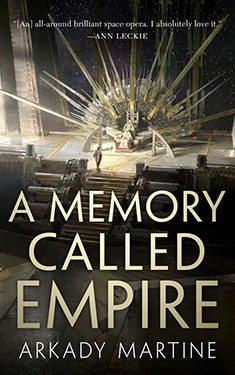Arkady Martine
Completed 3/9/2021, Reviewed 3/9/2021
3 stars
I should have liked this book better than I did. It had many ingredients that I look for in a SF novel: great prose, terrific world building, and great character development. Unfortunately, it fell into several subgenres I don’t always enjoy: space opera, court intrigue, and murder mystery. I have liked such books in the past, and I thought I’d like this one, but nothing about it gripped me. I spent about 450 pages not really caring what would happen next. It won the Hugo Award in 2020 and was nominated for several others. If I was voting, even having not read the other nominees, this book would not have been in my top three. 
The story is
about Mahit, the new ambassador from Lesl, a space station around several mining
worlds on the outskirts of the Empire of Teixcalaan that is in danger of being
annexed. She is replacing the last
ambassador Yskandr who died prematurely.
She has an implant of Yskandr’s memory/personality after he had been in
that position for five years, though he lived another fifteen. When she comes to Teixcalaan, she discovers
Yskandr was probably murdered. The
reality of his death causes his personality to collapse, creating a malfunction
in the implant. Now without his
guidance, Mahit must traverse the politics of an empire on the brink of a coup
while trying to protect her own home world.
The coolest thing
about the book is the memory/personality implant, known as an imago. It acts like a second consciousness in the
implanted person, carrying with it all the information necessary to continue
the job. Almost everyone on Lisl has an imago
and it is guarded as a state secret. Mahit’s imago of Yskandr malfunctions pretty
early on in the book, which bummed me out because I liked the interaction of
the two. She then spends the rest of the
book longing for that missing piece.
The character
development was quite good. I empathized
a lot with Mahit, even though her continuous longing for Yskandr’s presence in
her mind after the imago malfunction went on way too long. I also liked her cultural liaison, Three
Seagrass, and Three’s friend Twelve Azalea.
I didn’t like that all the people in the Teixcalaan were named in this
fashion, a number and an object. It made
the minor characters quite confusing. But
I did like the characters, even though I didn’t really care what was happening to
them in the story.
I thought the
prose was really great, but the author did commit my most hated infraction. She would begin a statement by a character,
then insert one to four lines of what the character was thinking or doing, then
complete the statement. It drives me
nuts. It’s one of the reasons I disliked
Michael Chabon’s Yiddish Policeman’s Union so much. To me, it breaks the flow of the thought.
I think what I
disliked the most about the book was the court politics and political
intrigue. While I liked the universe in
general, I found it hard to care about the different factions for and against
the government and/or emperor, the suppression of uprisings, and the movement
toward annexation of new worlds. The
only think I liked about it was that it provided with Mahit an opportunity to
develop as a player in the political game without the help of her imago. She got to grow emotionally and career-wise
without even realizing it.
I give this book
three stars out of five. I think many people
would probably enjoy this book (and have, as evidenced by the reviews on Worlds
Without End and Goodreads). It just wasn’t
my cup of tea. I found myself trudging
through out of my general obsessiveness of finishing a book. Sometimes, when I find the beginning and
middle of a book hard to get through, I still find the ending exciting because I’ve
been set up to enjoy it. But this time,
I didn’t really even care about the ending.
This is the first book of a series, and I’m hoping none of the sequels
win an award because I don’t want to have to read any more of it to keep up
with the Hugo and Nebula winners.
No comments:
Post a Comment